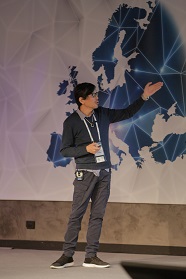“Disruption is a term that has been overused in the last 10 years. A lot of people talk about digital disruption, but to me the term often leads to people scratching their heads,” Eddie Choi told the audience at the UFI European Conference in Verona.
Many of us will be in agreement. The subject is a staple of plenary halls at business conferences and while we all appreciate the opportunities that accompany destabilising the status quo, the only experience most of us will have of being truly disruptive was followed by a trip to the principal’s office.
But despite the uncertainty surrounding this irrepressible plenary subject, Choi, the founding partner of Frontiers Digital and Executive Director of Milton Exhibits Group, says disruption in the business world can be easily explained, thematically, using organisational structure.
“I believe disruption will happen if you have an experience so complex that you need to go through a lot of steps to achieve one thing,” he said. “Then you will have disruption because you have a complex experience involving too many people. In your business trust is very difficult to maintain. Redundant intermediaries, service providers providing many small things. You need to communicate with many different people to get a job done.”
Disruption as an agent of simplification
Choi, also a columnist for interactive marketing magazine Clickz Asia, says disruption occurs in order to simplify this structure, eliminating the middle men and enabling you to communicate directly with your customer.

Eddie Choi at the UFI European Conference in Verona
“While I was working for an organiser, I asked why we couldn’t share our data with our exhibitors. They told me ‘this is my data’, and I told them otherwise: ‘this is their data’,” he said. “We collect it but we don’t share. We give them limited access.” At the end of the day they wanted more and we couldn’t provide it. If we are in this situation, disruption will happen.
Digital transformation is another ever-present term doing the rounds at industry events, one that for the last five years has led to a lot of Choi’s colleagues specialising in the subject. Today however, Choi says discussion on the subject is most commonly viewed in the rear-view mirror.
“We used to say digital transformation drives change but in my opinion it has forced change already.” But what specific change is he referring to? According to Choi, digital transformation creates change in four key areas.
Communication: “It completely changes communication using different means and tools for your professional and working communications, and how you communicate with your customer.”
Cultural and hierarchical: “Because communication changes, hierarchy changes. How many of you have a company Facebook that you use to share information, and the CEO is in that Facebook group? ‘A lot of people say to me: ‘Eddie I’m in a difficult situation, my CEO added me on Facebook and I don’t know whether I should keep posting info, or be honest etc.’ Sometimes of course, the CEO likes what you share. It’s now easier to reach out to a different level of employee or customer.
Process: Systems change, and when they do there is great deal of integration happening.
Measurement: The way you measure your employees, the way your customer measures the success of working with you will change. We’ll have a whole new set of measurement matrices to contentend with.
“At the end of the day this is about value change, everything is about value,” said Choi.







Leave A Comment